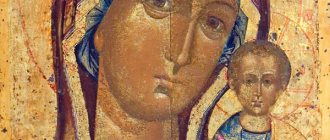Each of us is probably familiar with the phrase “everything is the will of God.” And many, most likely, thought about it. If we take it literally, it turns out that all a person’s aspirations, desires and prayers do not have independent meaning.
One religious philosopher from Denmark, Søren Kierkegaard, has words that prayer cannot change the will of God, but it can change the person praying. If we proceed from this, it means that there is no place for miracles at all, everything is predetermined.
How does this phrase relate to church views and, in particular, to the expression “all is God’s will?” and two others closely related to him? They will be discussed below. Let's try to figure it out. And also consider the expression “no matter what is done, everything is for the better.”
Two aspects
What does it mean “everything is God’s will”? To answer this question, it is necessary to make a reservation that theologians distinguish two aspects in it.
- Favor.
- Letting go.
The first, regarding intelligent substances, represents approval of their actions, desires and thoughts. And also support, manifested in the gracious help from the Holy Trinity and its blessings.
What does “everything is the will of God” mean in the second understanding? It refers to actions that are either morally neutral or contrary to God. He does not approve of such deeds, does not contribute to their implementation, but, despite this, he allows them to be carried out. This allows intelligent beings to act within the framework that was placed within them at their creation, according to their free choice.
To understand the meaning of “everything is the will of God,” we will give examples that characterize each of these aspects.
Examples of favor and permission
For the first aspect it is:
- Abel's sacrifice;
- Abraham's migration;
- the exit of the Jews from Egypt;
- construction of the tabernacle under Moses;
- construction of the temple under Solomon;
- confession of the Apostle Peter;
- Paul's appeal.
As a striking example of the second, we can consider the fall of Adam and Eve. God did not favor him, but at the same time did not interfere with this by the force of his own power. He did not stop the hand that reached out to the forbidden fruit, allowing him to try it.
Considering what “the will of God” means, let’s talk in more detail about these aspects.
Interpretation of the Church Fathers
What does “everything is God’s will” mean in the understanding of religious authorities? They consider this expression in the light of the dogmatic position according to which no one and nothing can, in principle, resist the will of the Creator. This interpretation dictates the understanding that everything that happens in the world of created beings happens only because the Lord wishes or allows it. Good and evil deeds - everything is possible only with the knowledge of the Heavenly Father.
However, the thesis under consideration should not be interpreted in a false sense, which assumes that God's providence is fate. That is, it would be wrong to assume that everything that happens unconditionally should have happened. Just as not everything that did not happen could not have happened in reality.
And a few more words about vanity and cleanliness
Likewise, words about God’s exclusive care are not spoken about all people. The lesson from the Ancient Patericon may be relevant here, when the Abba said to the fussy monk: “This means that we no longer need God’s care for us as children, because we consider ourselves both wise and capable of taking care of ourselves.” Ashamed of these words, the monk stopped fussing. In the history of the Church there are many examples of this kind of holiness, when Christians really merged so much with the will of God that they were, in the words of the already mentioned Metropolitan Anthony, “transparent, like pure glass, which reflects the ray of God’s will, and does not distort it,” as it distorts ray of light glass is dirty. But can each of us say that he is so pure and transparent to God that his life is completely given (in reality, not in words) into the hands of the Almighty Creator and is no longer guided by human self-will?
Homo sapiens
God endowed man with reason, as well as freedom of action, although the latter is largely limited by the Creator. This concerns its nature and individual characteristics, the force of circumstances. In moral terms, he can both violate and fulfill the will of God.
If a person’s desires and actions comply with his laws, the Lord favors him, helping him to fulfill his good plans. If the aspirations and actions of a sinner contradict the highest plans, they are not approved by the Almighty.
What does “God’s will be all” mean in the case of human freedom of choice? It is seen in the following. It was the Creator who, by his own will, gave man the ability to commit sin. On the other hand, he shows his patience and even long-suffering.
To better understand what “God’s will is for everything”, let’s say a few more words about human free will.
How does a person know the will of God?
In order to hear the voice of God and understand the purpose of His influence on the soul and life of a person, the believer is given certain points with the help of which he can understand the will of God.
- Holy Bible . This book quite clearly defines for us the boundaries of acceptable behavior and the criteria of God's will.
- Sacred Tradition . This concept contains many years of spiritual experience of the Church and Christians in the implementation of God’s commandments. Sacred Tradition can provide answers to almost all questions that arise for a Christian.
- Conscience . It is not for nothing that it is called the voice of God in the human heart. If the conscience tells the soul that the action taken was wrong, it is obvious that such actions are not related to the will of the Lord.
- Prayer . In the Christian tradition, prayer is called the main way of communicating with God, therefore it is considered a natural way of knowing the will of God.
- Blessing of the priest . If a clergyman blesses a person to do something, it means that this deed will benefit the soul.
- Patience . A person who knows how to silently endure the hardships of life gives the Lord the opportunity to do what He has provided for us.
In a difficult situation, you can make a prayer request to God
Many people are afraid to find out the will of the Lord, because this places a burden of colossal responsibility on their shoulders. Many people ask the question: “How to know the will of God?”, but not many strive to obey it. The Holy Scripture and the Church help us to find out the will of God, and observing it is a personal choice and spiritual feat of each person.
Synergy
Man, created in the image and likeness of God, is given free will. Without the possibility of choice, there would be no good as such, while the inner life and actions of a person would be guided only by necessity.
Free will is one of the main human virtues. But at the same time, this is a huge responsibility for him. This raises the question, why is this power of choice necessary if so many people abuse it?
The whole point is that without this salvation cannot be achieved. Since it represents communion with God, that is, life with God, eternal approach to him, enlightenment of the soul and illumination of it with divine light.
A person must voluntarily choose the path of salvation. God should be the main goal of his life. Salvation is seen as the love of the Creator for his creation, and the love of the creation for the Creator. In this regard, the nature of salvation is deeply personal. Theologians call this synergy - the interaction of Divine and human will.
Is everything God's will?
You are at the helm of your destiny. Every day you stop at many large and small crossroads, where the very intersection of God's desires and your dreams requires the decision to make a choice: to be your way or God's way.
Just as a coin has two sides, so your life has two destinies: the one that is from God, and the one that is outside of His will. You can make plans for life, have your own worldview, draw the future the way you want to see it, but, regardless of this, there is another side of the coin - there is a destiny for you from God.
1. How can I be sure that God really has a destiny for me, and that it is better than my plans and desires?
“My thoughts are not your thoughts, neither are your ways my ways,” says the Lord. But as the heavens are higher than the earth, so are My ways higher than your ways, and My thoughts higher than your thoughts” (Is. 55:8-9).
“Only I know the plans I have for you, declares the Lord, plans for good and not for evil, to give you a future and a hope” (Jer. 29:11).
“My bones were not hidden from You when I was created in secret, formed in the depths of the womb. Your eyes have seen my embryo; in Your book are written all the days appointed for me, when not one of them was yet” (Ps. 139:15).
From these and a number of other places in Holy Scripture we see that God has a destiny prepared for you. It is thought out in the finest details and trifles. This is the best thing that can happen in your life.
2. What will I gain if I yield to the will of God before my desires and plans?
God has the answers to all your questions before they even arise. “There is not yet a word on my tongue, but You, O Lord, already know it perfectly” (Ps. 139:4).
You see limitedly, until the nearest turn. God knows in advance: where, what and when will happen in your life. And before this can happen, He has already placed His guard and care. “You know when I sit down and when I get up; You understand my thoughts from afar. Whether I am walking or resting, You surround me, and all my paths are known to You. Behind and in front You embrace me and lay Your hand on me. Your knowledge is marvelous to me - high, I cannot comprehend it!.. If I take the wings of the dawn and move to the edge of the sea, there Your hand will lead me, and Your right hand will hold me. Shall I say: “Perhaps the darkness will hide me, and the light around me will become night, but the darkness will not be obscured from You, and the night is as bright as the day” (Ps. 139:2-12).
Everything is based on the belief that God really has a destiny prepared for you, and that it incomparably exceeds all your expectations, plans and possibilities.
3. Is it possible to make God's will become my desire?
I was lucky enough to hear perhaps the most accurate example in this regard. The story is told by an unexpected observer who entered the church and took a place in the last row. In the midst of the sermon, a woman entered the hall with a boy of about seven years old. Having taken a place not far from our narrator, she suddenly discovered that her pupil was standing on a bench and trying to watch the preacher over the heads of the parishioners. Having sat him down on the bench, the woman strictly ordered him not to do this again. A few minutes later the scene repeated itself. The woman, annoyed, shouted, “If you do that again, I’ll sit on top of you!” The kid could hardly suppress his curiosity, not being able to see the pastor, and at the moment of climax he quickly jumped onto the bench again. Here the woman really behaved coolly: she forced the baby back and sat on him. “And here, from behind this fat woman, I heard a thin child’s voice: “Even though you’re sitting on me, I’m still standing inside!!!”
Wonderful words belong to D. Carnegie: “The most effective method of getting someone to do something is to make him want to do it.” This is what God practices. We find in the Bible that “He works in man to will according to His good pleasure,” that is, He makes you want what He wants. This is the highest achievement of God in us: not when religion puts us in a prison of prohibitions, but when God ignites the desire that is the opposite of sinful - the desire to do His will.
It is impossible to live without desires, but the only true way is to change desires in accordance with the will of God. God makes His will desirable for you. David writes about the righteous that “his will is in the law of the Lord,” that is, he voluntarily, of his own free will, obeys the law of God. This is his desire.
4. Why is it so categorical: either the will of God, or my desires? Why do you need to choose one?
I call this the Gethsemane Crossroads of Desires. Such crossroads can be large and small, but each of them is a choice, a struggle. In the garden of Gethsemane, the will of the Father intersected with the will of the Son, someone had to give in to someone: either it would be like the Father, or like the Sons. But in the end, Christ said: “My Father! .. not as I want, but as You want. Not my will, but yours be done.”
We sometimes think that God takes pleasure when we beg Him for something, but this is completely untrue. He wants to bless us more than we want to. The reason for His frequent silence is that we, not interested in His will, come with our own plans and intentions and ask Him to bless our will, while we are already blessed in His will.
5. Why cannot God bless my desires, but only blesses me when I am in His will?
Often people, disobeying God, rejecting His will, choosing their own path and reaping the bitterness of their paths, without thinking, slyly, and purely traditionally say: “Everything is God’s will.” Moreover, some even blame God for cruelty for the supposed “destiny sent down from Him.” I want to object to you and say: do not be mistaken, it is not reasonable to attribute everything to God’s will. Quite the opposite - more often it happens against His will.
Judge for yourself. Here Jesus Christ prophesies: “Jerusalem, Jerusalem, who kills the prophets and stones those who are sent to you! How often have I wanted to gather your children together, as a bird gathers its chicks under its wings, and you did not want to! Behold, your house is left to you empty” (Matt. 23:37). A few decades later, Christ’s words came true - Jerusalem was destroyed.
I think that at the time of the capture of Jerusalem, many religious leaders explained it to the people in approximately the same way: they say, “everything is the will of the Lord.” However, the capture of Jerusalem was a consequence of the fact that the Jews, in the words of Christ, “rejected the will of God for themselves,” did not want to accept fate from God and chose their own path. Therefore, whenever you go against God, do not call His will the consequences of your own disobedience to Him.
So, I think it wise to spend more time knowing His will than praying for the blessing of our desires.
God cannot bless your plans (to harm you) not for good. But God will gladly “do whatever you desire” when you are with Him.
6. Can my future really be happy or unhappy depending on whether I follow my own path or the path of God's will?
God doesn't snatch the steering wheel from your hands. You hold the helm of your destiny. The choice is yours. Moses said to Israel: “I call heaven and earth as witnesses against you today: I have set before you life and death, blessing and curse. Choose life, that you and your descendants may live” (Deut. 30:19).
Here they are, these two paths: the path of life and the path of death, the will of God or your self-will. Choose!
Job was at a crossroads - to bless God or curse, to blaspheme and die, he was faced with a choice: to be happy or unhappy in the future...
This choice was completely in his power, it was in his power to choose life or death, blessing or curse. And instead of what his humiliated pride demanded, the whispering of his wife, he chose what was the right path. Against all odds, he blessed God.
And God blessed Job, for he chose God’s path, God’s will.
The conclusion is simple and UNIQUE: you yourself hold the reins of your destiny.
Every day, many times you stop at a fork in the road that requires your decision: to follow the path of God or to go your own way.
Sometimes you have a lot of time to think, sometimes you have no time at all, sometimes it’s hard to decide, sometimes it’s easy, but Christ said: “I am the way... and no one comes to the Father except through Me.”
Whether you like it or not, overcome self-will and move in the way of His will. You may not be able to understand everything now, but this is not so important, it is important to know and be sure that the chosen road is the one that will lead you in the right direction. Say, as Christ said: “Not my will, but Yours, be done, not as I will, but as You will.”
Alexander Shevchenko,
Pastor of the House of Bread Church
Should we resist fate?
The Roman Stoic philosophers said that fate guides the willing, while it drags the unwilling. In their minds, man's relationship with God was like a one-way street. Only God acts on it, and man only passively perceives the results of his actions. All attempts to resist one’s predetermined fate can only lead to loss of strength and suffering that has no meaning.
As it became clear from the explanations of Christian theologians, a person has free will, given to him from above. Of course, if he tries to drive a passenger car towards a dump truck in order to arrange a competition with it to see who will push whom off the road, the person cannot change anything here. But the believer has a choice: to move along this strip towards God or away from him.
Next, let's look at what it means to “rely on the will of God”?
Prayer as drawing closer to God
And a miracle as a result of his prayer can happen exactly where he moves towards the Creator. How does this happen, and what should you pray for? One of the Russian ascetics, Saint Ignatius (in the world - Brianchaninov) wrote that God does not need prayers.
Even without our asking, He knows what each of us needs. On those who do not ask for anything, he also pours out his bounties. Prayer is necessary for the person himself. She brings the one who asks closer to God. Without it, a person is alien to the Almighty. The more a believer practices it, the closer he becomes to the Creator.
Thus, the idea is conveyed that God knows about the needs of everyone and, in His mercy, rewards everyone. Therefore, you need to rely on his will, follow his commandments and live according to your conscience. And in your prayers ask for his blessing.
Here, as it were, Kierkegaard’s thought, which was mentioned above, is clarified. With the help of prayer, a person can change in very specific ways. She can bring him closer to the Almighty and thus prepare him to receive the benefits that he pours out on his children without any requests from them. This is the meaning of the expression that one must rely on the will of the Almighty.
How to Know God's Will
The will of God can manifest itself in specific life situations if it is possible to compare them with the commandments from the Holy Scriptures and the movements of human conscience.
Most often, we want to find out the will of the Lord in small everyday situations, when some sudden event occurs, or we do not know what decision to make. Wanting to do something more profitable for himself, a person begins to rush from side to side, not understanding what he needs to do.
The main core of determining the will of God is the Commandments of the Lord
Often people fictitiously entrust their fate into the hands of God, but deep down they want life to be built in accordance with their own ideas about good and bad. People want their own desires to miraculously coincide with the desire of the Almighty, and thus His will will be fulfilled, convenient and desirable for the person himself. This approach to recognizing and understanding God's will is erroneous.
Important! In order to know God's will, we need to develop spiritual hearing. God's influence is not a sealed secret; a person does not have to go to the elders or become a monk in order to hear the voice of God and trust Him.
Every day a Christian must learn to trust God: without the most complex spiritual practices, without special rituals, without demanding any supernatural abilities from himself. You just need to learn to put the Lord at the center of your life, and not momentary ambitions and your own pride. Then life will become easier and calmer, and peace will reign in the person’s soul.
What does it mean to “walk according to the will of God?”
The Gospel of Matthew says that not everyone who turns to the Lord will be able to enter the Kingdom of Heaven. But only the one who fulfills the will of the Heavenly Father. According to Theophan the Recluse, a bishop who lived in the 19th century, this means that it is impossible to be saved with the help of prayer alone. It is necessary to fulfill the will of God, that is, what is entrusted to a person according to the structure of his life and rank.
And in prayer we must mainly ask that God help us not to deviate from his will. The one who zealously fulfills it will have more bold prayer, and he will more easily gain access to the throne of the Most High. It happens that if prayer is not accompanied by walking according to the will of God, then it is not real, heartfelt and sober, but only verbal, external.
While reading it, there is a moral malfunction, the person is covered in verbosity, like fog, and his thoughts wander. Only by doing both with piety will fruit appear.
What is the will of God: what it is and why it is needed
The will of God is a complex and multifaceted concept that combines what a person must do to acquire the Kingdom of Heaven, and Divine reward, and the internal influence of God himself, guiding a person on his path.
The will of God is the only final criterion of good and evil in this world
It follows from this that God’s will is not only those moral requirements that every Christian must meet, but also grace, achieved in the unity of the Lord and man.
Properties of the will of the Lord:
- is a source of good on earth;
- perfect and omnipotent.
If we talk about the differences in the concept of “God’s will,” then it can be facilitating and releasing.
Contributory will is those events that directly lead us to repentance and salvation. The second type of God's influence is releasing will. For example, a person deliberately chooses an unrighteous path - he sins and enjoys this lifestyle. The Lord can stop such a person at any moment and stop his destructive actions, but He does not do this.
Important! The Lord gives every person the right to choose - the sinner has made his choice and follows the path that he has determined for himself. The Lord does not hinder him, and this is His releasing Will. God does not assist a person in committing sinful acts, but does not prevent him from committing them.
If we consider the question of the necessity of the will of the Lord in the narrow context of one human destiny, then the Divine influence is aimed at promoting the salvation of the human soul. If we consider this problem more globally, the will of God becomes the totality of all its particular manifestations, which are united by the general plan of the entire universe.
Deep peace and serenity
Theophan the recluse says that whoever begins to firmly follow the commandments of the Almighty, which have an unshakable and indestructible foundation, will also become firm and steadfast. Those who chase after transitory values have troubled thoughts. But as soon as such a person comes to his senses and returns to the path of God’s will, his thoughts, like his undertakings, will become orderly.
When he finally acquires the skill of this way of life, everything inside him comes into serene order and calm order. Having begun in this world, serenity and deep inner peace will flow into the next life, remaining there forever.
This is what “walking according to the will of God” means—among the general flow of life around us and the constant one that does not flow within us. This is what Theophan the Recluse wrote.
Chapter 1 Mysterious death warnings
Signs of God's Providence in human life
The world in which we live is full of signs that require reading, believed St. Nicholas of Serbia. Here is an excerpt from his book “Symbols and Signals”.
“Often, unexpectedly, in good time, we meet a person who disperses the clouds that have gathered in our soul, involuntarily resolving some of our personal problems. It is not uncommon to hear a word from another person that resonates with you, or to say an encouraging word to someone. Or suddenly we receive a letter from someone, exactly when we need it. Or, confused in life's circumstances, we are desperately trying to reason with our small minds, trying to extricate ourselves from a hopeless situation, when suddenly something happens that radically changes the situation. Consequently, an unexpected meeting, a word, a letter, and an incident are all signs given to us either as punishment, or as a reminder, admonition, encouragement, or as a call to repentance.
A person usually believes that all his thoughts are his property, his work, coming from himself. Meanwhile, this is incorrect, because thereby a person proclaims his spirit as a certain absolute part, which is not subject to the influence of spiritual forces, neither good nor evil. In fact, the human spirit is influenced by many spiritual forces, just as the body is influenced by many different physical forces.
Evil thoughts, immoral and godless, come mainly from the spirit of evil and lies. Because of our sins and with God's permission, the spirit of evil pierces our spirit with arrows of lies, vicious pictures, sinful sensations and fantasies.
When we suddenly begin to constantly think about some person who is far from us, then this is a signal that he is worried or talking about us, or doing something for us (or against us), or approaching us himself, or walking letter from him.
People's premonitions are much stronger signs than thoughts. The Bible tells how Isaac, Jacob, and David all felt their death approaching and so they called their sons to bless them.
Many people have premonitions of their death. Some officers and soldiers in the war had the firm belief that they would die on this very day. How few of them exclaimed: “Today I will perish!” This feeling, the premonition of death, cannot be known by those who have not had it. However, the fact that such a premonition takes place is a repeatedly confirmed fact. It is fortunate that they had a presentiment of their imminent death and managed to repent before God in advance, through prayer and absolution they were able to prepare for the transition to the next world.
Cleopas and his friend had a premonition of Christ's proximity. When they went to the village of Emmaus, the risen Christ joined them and spoke to them, but they did not recognize Him with their eyes. However, when He became invisible to them, they confessed to each other: didn’t our heart burn within us when He spoke to us along the way and when He explained the Scripture to us? (Luke 24:32).
Reverends Sergius of Radonezh and Seraphim of Sarov foresaw the appearance of the Most Holy Theotokos in advance. “Today there will be a great visitation!” they told their novices. Many other saints had a similar premonition, like a sign from above.
Animals also have a premonition as a signal from above, especially before bad weather or before a disaster, for example, before an earthquake. There are cases when animals anticipate a misfortune that is about to happen to the owner: a horse neighs anxiously or a dog howls. When Saint Artemius was about to go to martyrdom, the deer he had fed began to lick his hands and began to cry.
Sometimes a person suddenly, for no apparent reason, is attacked by melancholy and melancholy. Subsequently, it turns out that this was a sign that some kind of misfortune had happened at his home: the death of a relative or friend, or some other heavy blow.
A feeling of extreme despair that directs a person's thoughts towards suicide is a clear signal that an evil spirit - the spirit of despondency - has taken possession of the soul of this person.
Joy is also a signal. The greatest Christian saints claim that when a person truly repents and fervently prays to the Lord, he feels great joy in his heart and his soul becomes warmer. They interpret this as a sign that the Lord has forgiven the sin for which the person repented in prayer.
The Creator does everything possible to save people: to enlighten those who are foolish, to enlighten those who are darkened by reason, to lead those who are lost on the right path, to awaken those who are sleeping. He conveys His holy will and His disposition to people through the stars, and through things, and through animals, and through events, and through dreams. It happens that the Lord warns people of disasters.
In addition, He sends signals to people through other people, and also to certain nations through other nations. A spiritual person feels the presence of God every day, every moment he is convinced of it. And Holy Scripture, as the Book of God’s will in the destinies of people and nations, daily confirms the truth of these testimonies.
Saint Nicholas (Velimirović), bishop. Žičski Ohridski. Symbols and signals. – Pokrov, 2003. pp. 3–15.
An example of trust in God's will
A striking illustration of such trust is the prayer of Philaret of Moscow (18-19 centuries), saint, bishop. He, turning to the Lord, said that he did not know what to ask of him. After all, God alone knows what he (Filaret) needs. God loves him more than he can love God. Father, give your servant what he himself does not know how to ask for.
Further, Filaret exclaims: “I do not dare to ask you for either consolation or a cross, I am only standing before you. My heart is open to you. You see needs that I don't know about. Look and create according to Your mercy. Heal and defeat, raise and bring me down. I am silent and in awe of your holy will and your destinies, incomprehensible to me. I surrender to you and sacrifice myself. I have no other desire than to fulfill your will. Teach me prayer and pray in me yourself.”
An example of uncertainty
This is the journey of the apostles with Jesus into a storm on a raging lake. They were frightened and woke up the Teacher, who was sleeping in the stern. At their request, he performed a miracle. He commanded the winds to subside. But at the same time, Jesus turned to his disciples reproachfully, asking: “Where is your faith?”
In the presence of the lord of storms on the boat, the disciples decided to ask him to perform a miracle. The fact that the Creator of the world, in the person of the Savior, was in the same boat with them, they considered insufficient to feel safe. The apostles' request was granted.
God sees everything
Through their prayer, the miracle was possible; it remained forever in the history of mankind, testifying that God hears any requests. However, along with this miracle, the Divine rebuke addressed to the disciples who asked also entered history.
Something similar happens to people when, experiencing everyday storms, they turn to God with a request to help them. They think that the Creator has forgotten about them, that he does not see what is happening, that he does not control events. And the fragile boat of their life is about to be overwhelmed by waves of adversity. However, God, with his invisible participation, always accompanies us in our destiny.









